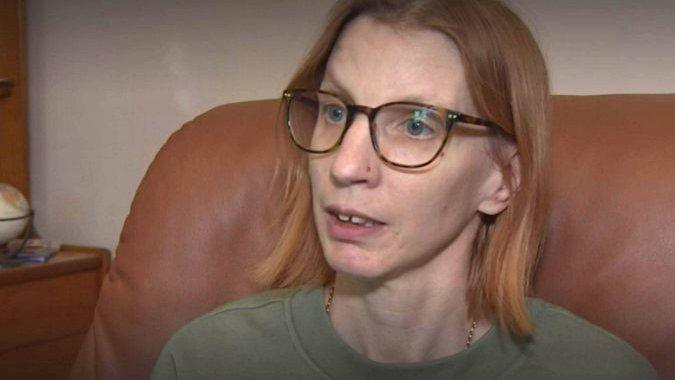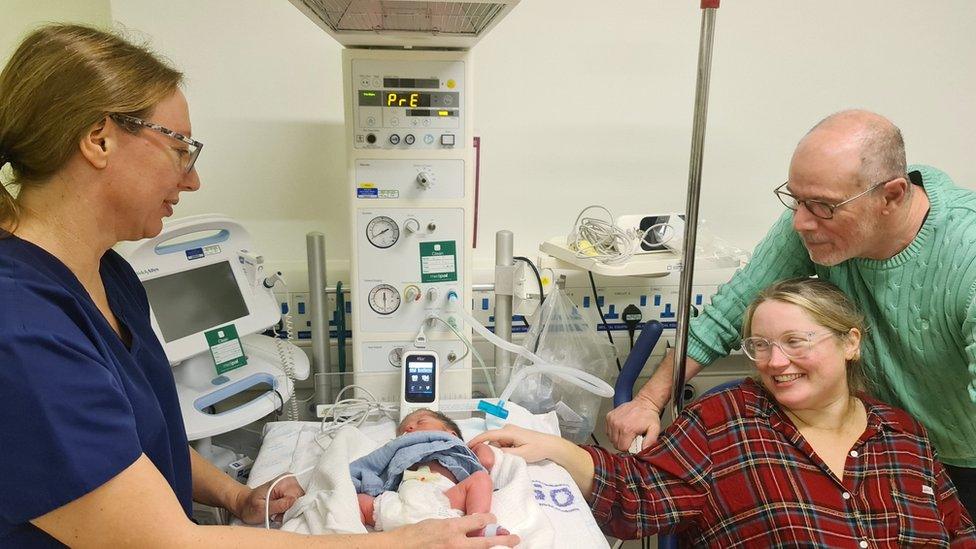Mum believes simple test saved her baby's life

Michelle Powell says her daughter Freya looked perfectly healthy, but the pulse oximetry test showed she had a heart defect
- Published
A mother believes her newborn daughter's life was saved because of a simple test for heart defects in babies.
Michelle Powell said she was thankful for pulse oximetry, which identified a narrowing of a vital blood vessel in her daughter Freya's heart.
Doctors are now warning babies are dying unnecessarily or being left brain damaged because of a failure to adopt the simple test in all UK hospitals.
Ms Powell, from Redditch, gave birth at Birmingham Women's Hospital, where the test was first pioneered more than 10 years ago.
The pulse oximetry test takes five minutes and measures a baby’s oxygen levels.
Since 2018, is has been used in every state in the US with a report finding it reduced deaths by a third.
But despite its success it is still yet to be made part of the UK's national screening programme.
'Looked perfectly healthy'
Ms Powell told BBC Midlands Today that without pulse oximetry Freya could have possibly died just a day after she was born.
"She looked perfectly healthy and she would have been sent home," she said.
"[But] within 24 to 36 hours she would have collapsed and who knows then."
The National Screening Committee (NSC) has been deliberating on implementing the test across the NHS since 2012.
A Department of Health and Social Care (DHSC) spokesperson said the NSC took pulse oximetry "extremely seriously", but it was waiting for the results of further research before it reviewed its possible implementation across the UK.
The spokesperson added that physical examinations for newborns also checked for congenital heart disease twice by the time the baby was eight weeks old.
But a study that screened more than 20,000 babies at six hospitals in Britain, published in 2011, found that adding the test to traditional techniques identified 92% of babies with problems.
'Results inconclusive'
Prof Andrew Ewer, the report's lead author, has called for its adoption across all hospitals.
Prof Ewer, from the University of Birmingham, said the test had already been adopted in many countries across the world, including some low income countries.
He said 78% of maternity networks had adopted the test, but there was a postcode lottery.
In the West Midlands, it is not yet used in Staffordshire and Walsall.
The DHSC spokesperson said the NSC "ran a consultation to establish the effects of screening all babies for low oxygen, the results of which were inconclusive".
"The UK NSC supported the call for further research to be undertaken before it reviews this issue," they added.
"This is ongoing, and the results are eagerly awaited."
Follow BBC West Midlands on Facebook, external, X, external, and Instagram, external. Send your story ideas to: newsonline.westmidlands@bbc.co.uk, external
Related topics
- Published12 March 2024

- Published4 February 2024
